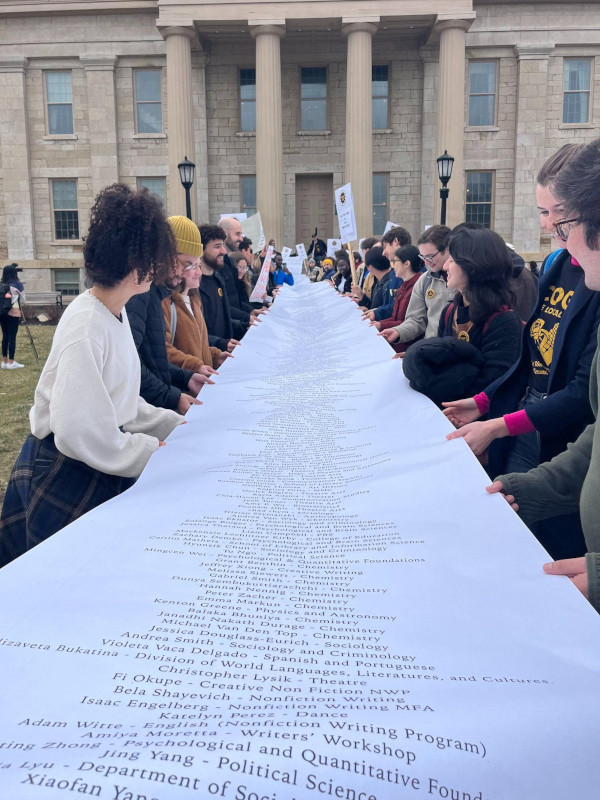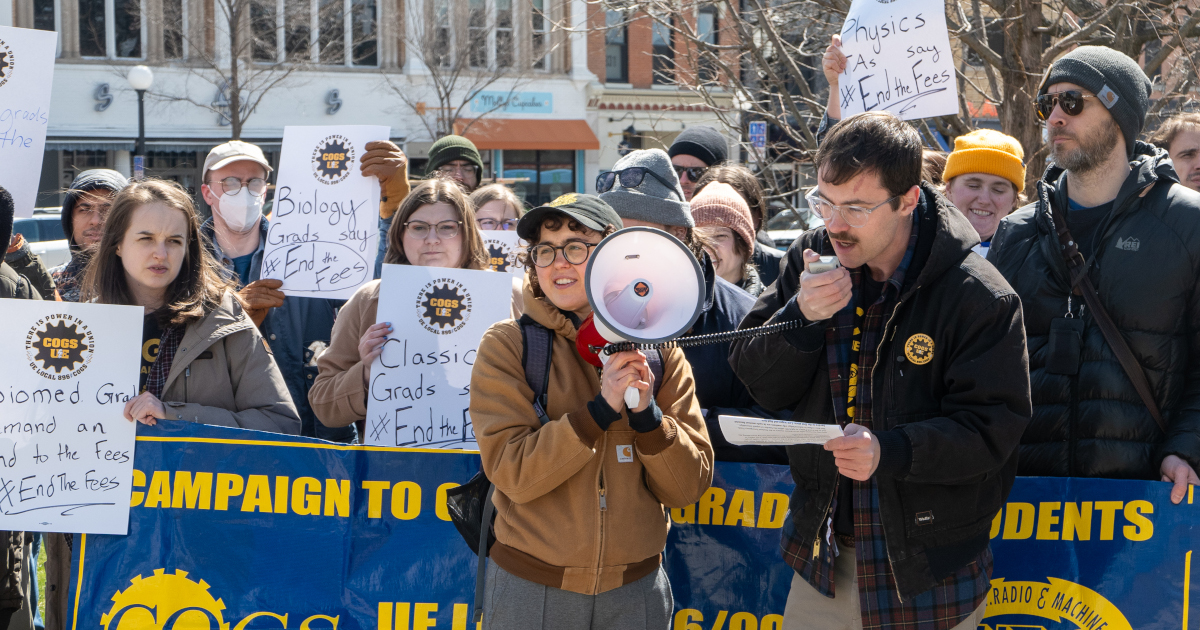Despite being a non-bargaining year, UE Local 896, also known as the Campaign to Organize Graduate Students (COGS), is in the midst of a fight to win concessions from the boss. Since October 2023, COGS — which represents close to 2,000 graduate teaching and research assistants at the University of Iowa (UI) — has been organizing a campaign to end the University's practice of charging graduate workers hundreds of dollars in fees every year to work. Graduate teaching and research assistants are the only UI workers charged such fees, despite being critical to the university's mission of teaching and research.
“No one should have to pay to work,” said Local 896-COGS President Hannah Zadeh. “Teaching assistants log the majority of educational contact hours with undergraduate students in classes, labs, and office hours. The UI could not function without the work of graduate research and teaching assistants.”
The University of Iowa forces graduate workers to pay a slew of miscellaneous and often ill-defined fees. Every semester, graduate workers turn over their hard-earned dollars to administration for such nebulous services as “building fees,” “records and documents fees,” and “professional enhancement fees.” The UI does not provide an account of how fee money is spent, and yet, graduate workers are forced to pay these fees at the start of every academic year, before receiving their first paycheck. Fees are especially burdensome for international and first-year graduate workers, who must pay hundreds of dollars in additional fees. This year, first-year international graduate workers at UI paid more than 7 percent of their yearly wages back to the University.
“Many international graduate students come to this country with families to support, and because of U.S. law, their family members are not allowed to get a job,” said Local 896-COGS Unity Committee Chair Mingcen Wei. “Meanwhile, the University of Iowa spends large amounts of money traveling around the world to recruit international students. If we want graduate education at the UI to be accessible to everyone, we need to end the fees.”
A History of Fighting Fees
After COGS successfully eliminated tuition for all graduate workers several years after forming in 1996, the UI began to charge “student fees.” Back in 2015, COGS members called these fees “back-door tuition.”
For years, the UI and the Iowa Board of Regents insisted they did not have to bargain with COGS over fees. However, in 2015, the Public Employee Relations Board (PERB), the state labor board in Iowa, ruled that these fees should be classified as “supplemental pay” and thus were a mandatory topic of bargaining.
By 2017, COGS had won a 50 percent reduction in mandatory fees for graduate workers. However, an anti-union law passed that year made supplemental pay an illegal topic of bargaining for public-sector workers in Iowa. The new law left COGS unable to formally bargain over fees with the Iowa Board of Regents, all while the UI continued to increase fees.
Campaign to End the Fees
At the start of the 2023 academic year, UI graduate workers were hit with a $100 fee increase. Anger over the increase proved a catalyst for an issue-based campaign.
“It’s outrageous that the University expects us, underpaid graduate workers, to finance the upkeep and expansion of our own workplace,” said Glenn Houlihan, a Local 896-COGS department steward. “The $100 fee increase this year was infuriating, especially because the University claimed this money would fund campus construction projects. They [UI admin] treat us like their personal piggy bank, going to us every time they want to fund new construction projects.”
In October, COGS membership voted to launch an organizing campaign to address fees. At the center of the campaign was a petition drafted by the members, addressed to the UI administration, demanding an end to fees for graduate workers.

UE Local 896-COGS members deliver petition signatures on a giant scroll. Photo: Jenny Singer, Local 896-COGS.
The petition itself was an organizing tool. Agitating and organizing around the issue of fees in a non-contract year has brought in new members and organizers across departments. For several months, stewards and organizing committee members worked on cross-departmental organizing — building meetings, walk-throughs, and phone banks — centered on the petition.
A few months later, over 1,000 graduate workers, a majority of teaching and research assistants, had signed the petition. On March 5, COGS members marched to the UI president's office to demand an end to graduate worker fees. Outside the president's office, 80 COGS members unfurled an 81-foot-long paper scroll containing the names and department affiliations of every worker who signed the petition. Members carried the scroll of names into the president's office and issued their demands, giving the UI two weeks to respond.
In response to the petition, the UI wrote a letter to the union declining to budge on the issue of fees or even meet with COGS to negotiate, citing “budgetary constraints” as the primary reason.
Targeting UI Fundraising: Fee Elimination Before Donation
In response, COGS members organized a press conference on March 27, the same day as “One Day for Iowa," the University's massive annual fundraising day. Members' message to UI donors was clear: “fee elimination before donation.” Fifty COGS members came to the press conference, representing workers from 20 different departments. Set up directly across from University fundraising tents, COGS members spoke to the press about the burden of low wages, high fees, and the indignity of paying fees to an employer holding more than three billion dollars in endowments.
Responding to UI's refusal to lower fees due to “budgetary constraints,” Local 896-COGS Area Steward Emma Croushore told the press:
If budgetary constraints mean the UI is telling some of its lowest paid workers that this University is “broke,” then a three billion dollar endowment and wage increases this year for the president and every college dean says otherwise.
The UI has hundreds of millions of dollars in liquid cash that could be used today to pay its workers. But they have so far refused to invest that money in education — in its teachers and researchers. This is not about money or budgetary constraints; this is about priorities.
In response to the UI advertising the financial precarity of its student population to leverage its own fundraising, Local 896-COGS Social Chair Cary Stough highlighted the UI's role in creating such hardships by charging high fees and providing low wages. “The arsonists are pretending to be firefighters," Stough said.

Cary Stough speaking at March 27 press conference. Photo: Chad Rhym, Local 896-COGS.
Stough ended by underscoring how the UI undermines its own mission of teaching and research, making graduate education inaccessible for everyone but the wealthy by charging some of its most critical employees a fee to work:
If the University of Iowa wants graduate education to be accessible; if they want to produce cutting-edge research and conduct quality classes, they need to pay graduate workers higher wages, not charge us higher fees.
Throughout the day, COGS members took to social media to express their displeasure with the status quo. They flooded the UI president's fundraising posts with hundreds of comments demanding the elimination of what some members commented was a “pay-to-work scheme.” Many shared testimonials about the detrimental impact of these fees on working and living conditions.
Since the petition delivery on March 5, COGS' “End the Fees” campaign has received extensive and sympathetic press coverage from local (Iowa City Press-Citizen, Iowa Gazette, Daily Iowan) and state (Iowa Capital Dispatch, Iowa Starting Line) media. As a consequence, the University of Iowa has been repeatedly forced to justify these burdensome fees to the broader public, which they do with what Croushore called "tired platitudes and recycled language.”
While the battle against fees is not yet won on an administrative level, COGS’ End the Fees campaign has proven highly effective on at least two fronts: forcing the University to confront graduate worker dissatisfaction, and mobilizing workers to seek change. Since the campaign’s kickoff in Fall 2023, COGS’ organizing capacity has surged thanks to the recruitment of student workers belonging to such diverse departments as Chemistry, English, Physics, and Social Work. This increased capacity will be critical as the union continues to escalate the campaign to end fees and moves toward contract bargaining next year.
